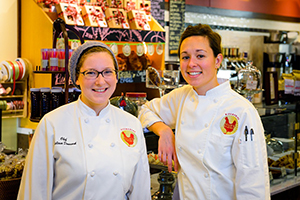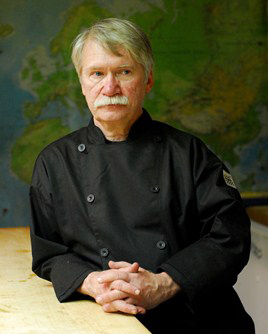Chefs Speak Out: Ellie’s Takes the Cake
Wednesday, 10 December 2014 03:00
 An award-winning pastry chef and talented baker and cake artist bring their seasonally inspired, artisanal confections to life at this Parisian-style Rhode Island bakery.
An award-winning pastry chef and talented baker and cake artist bring their seasonally inspired, artisanal confections to life at this Parisian-style Rhode Island bakery.
As a young teen Melissa Denmark, CC, was constantly reading cookbooks and applying what she learned in the kitchen. An avid baker, she joined a mentorship program at a French restaurant during her final year of high school. That early training led her to the pastry-arts program at Johnson & Wales University in Providence, R.I., where she graduated summa cum laude.
After working at a Ritz-Carlton property in Florida, Denmark went on to work with a cake decorator in Maryland and for Bobolink Dairy Farm and Bakeyard in New Jersey. It was during her latter stint that she came to appreciate the importance of sustainability and using farm-raised foods.

 ’Tis the season, says Chef Weiner, who among other things suggests a “Build a Gingerbread House” station to raise needed funds for programs.
’Tis the season, says Chef Weiner, who among other things suggests a “Build a Gingerbread House” station to raise needed funds for programs. In his final installment in a series on student assessment, Dr. Mayo says it is increasingly important to explain to students the criteria we use in grading. Not only does doing so make our jobs easier, but it is only fair to tell students ahead of time how they are going to be evaluated.
In his final installment in a series on student assessment, Dr. Mayo says it is increasingly important to explain to students the criteria we use in grading. Not only does doing so make our jobs easier, but it is only fair to tell students ahead of time how they are going to be evaluated. Employers seek graduates who follow directives, have a strong foundation of technical skills and enthusiastically respond, “Yes, Chef.” Yet knowing the “why” and “how to” is as important a skill as the actual process of completing a task.
Employers seek graduates who follow directives, have a strong foundation of technical skills and enthusiastically respond, “Yes, Chef.” Yet knowing the “why” and “how to” is as important a skill as the actual process of completing a task. A free classroom offer to teach students why menuing domestically raised fish and seafood is an important way to keep both customers and the bottom line happy.
A free classroom offer to teach students why menuing domestically raised fish and seafood is an important way to keep both customers and the bottom line happy.